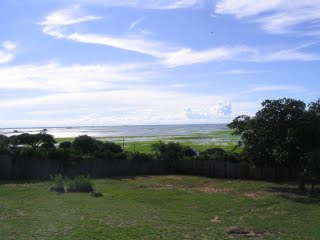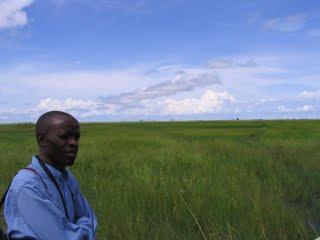Stuck on a Muddy Plain
Well as adventures go, this one is best told from the comfort of dry land and a chair instead of during the event.
In Mongu, Zambia our office has made loans available to the local people for trade and agriculture. The Zambezi river has created a large (30 mile wide) plain that runs from the north to the south of the province that is perfect for grass and has been used for planting rice since the 70’s. During the rainy season it fills with water from the rain and in very wet years, becomes a flowing mass of water, usually capable of destroying the majority of the rice plants before harvest.

The plain as seen from the office.
We have a client that was determined to plant rice in the plain this year, even though things went badly last year. One of our goals is to visit the places where our funding is invested to see for ourselves that is was properly invested and to give counsel/advice as needed. Now because this plot was so far away from the office and the office staff really did not want to go there, they waited until I came for a visit to make the trip. (Maybe that should have been my first clue.)

Our AW colleague in the plain.
We took the 4WD land cruiser with some bags (of I was not sure what) in the back and headed out toward the next town. Before leaving Mongu, we stopped and picked up the client from the local internet café. As we left, my Zambia colleague said, “There really isn’t enough space in the front for all of us so why don’t you drive?” (That should have been my second clue.) But hey, why not, so we took off.
Shortly after we arrived in the next town, the road ended (mainly because of disrepair) and we followed alongside it on a bed of sand that keeps washing down the hill with every heavy rain. As we arrived at the bottom of the hill, there was a 50 foot wide stream with oxen and cart being led through. “Straight ahead” the client said. (That should have been my third clue.)
On the other side of the stream was a sandy path, that stretched out into the plain. We followed it as it went in and out of flooded areas. Just keep this baby moving I thought to myself and we should be ok. At one point the water was so deep we were pushing water with the grill. But for the most part, the soil under the water seemed to be sandy and not clay. On occasion when I tried to drive out of the path on the grass, the soil provided less traction and seemed to bog us down. (That should have been my fourth clue)
We had been driving for about 40 minutes when the client finally said, “We are almost there. We need to look for a small path just after this clump of bushes.” So as we rounded the bush, I turned right and off the barely visible track. We were headed for a plowed field with some standing water and I could quickly tell we should not have turned at that particular bush. As I turned left to get back to the track, we encountered more water and just a few feet later our momentum began to slow. Because we were only a few feet from the original track I tried to get back to it, but (you guessed it) down went the front right tire into the soft clay soil. (It was 9:30 a.m.)
Now what? My colleague took off his shoes, rolled up his slacks and jumped out into the ankle deep water. He grabbed one of the bags from the truck and started pulling out some dry grass. Stuffing it behind each of the wheels, he said “Now try it”. No, luck the tire just went deeper. I climbed out to the bed of the truck and suggested they get some help to push this thing out. There was an older gentleman who came up and said he would get some men from the village about 2 kilometers back. We waited an hour and he showed up with an axe and 4 women, two were tiny things with babies on their backs. (That was not just a clue, but a big red flag. This was not going to work!)
They chopped some sticks and tried to put them under each wheel. Then we tried to back it out. Before you know it, the front tire was now spinning freely. The car was down on its frame and the only thing that would get us out would be several span of oxen or a tractor. When I told my colleague, he got on the cell phone and between the sentences of Silozi, I heard the English phrase, …”what we feared most”… We were stuck miles from the nearest tractor. Call a tractor I said, and make sure they bring a strong chain. This truck is heavy.
They had located a tractor and now just needed to find fuel. No fuel in the last town, so it could be a while. (It was 10:30 a.m.) In the meantime, we decided to walk to the field which was just 300 meters away through the water. Taking off shoes and socks, then rolling up the pant legs, off we went. We walked along the edge of the field, talked a while, then went back to the truck. (It was 11:30.) We waited an hour, then called. No, the tractor had not left yet. Call someone else. I took a nap. The news at 1 pm was the tractor and office driver were to meet at the fuel station at 2 pm to fuel the tractor. Hmm, by this point I was thinking we might get home by dark.
Sure enough, for the next 4 hours I watched a few birds, (3 raptor species, song birds, egrets and others) and we waited. No drinking water, no food and nowhere to go. Around 4:30 pm my colleague said, “Am I dreaming or do I hear the sound of a tractor?” Sure enough, off in the distance we saw a tractor moving slowly along. As it came closer, we could pick out about 8 people riding on it.
As the tractor turned around and backed up to the truck, they pulled out an old 30 ft piece of 1 inch rope that was frayed, rotten and down to 2 strands in some places. (Another big red flag! No chain? That would be too easy.) Three guys grabbed it, measured out 3 equal lengths and wound it up into a big French braid, then twisted in a ¾ inch nylon rope. Well maybe. At the first pull, the French braid snapped like a wet noodle. Hmm, now we only have about 15 feet of bad rope left. Not to be discouraged, the driver backed up to the truck and they doubled the remaining rope and this time it held and between the tractor, the guys pushing and the truck’s own power, we got to terra firma. (It was 5 p.m.)
Now to get back through the plain and onto high ground. This time I stayed on the track, no matter how deep the water. By 6 we were on tar roads and in the office by 6:30 p.m. From a productive perspective it was a lost day. My take was: I understood the challenges of working in the river flood plain environment a bit better, could sympathize with the challenges of distance and terrain, plus had a few new ideas on how to improve the productivity of the rice and a slight sunburn.
As we covered the last stretch toward home, my colleague said, “Now you know why I don’t like driving in the plain. Give me sandy soil any day, but when you can’t see what is under the water, I let someone else drive.” Really the driving was not so bad, it was the advice to “turn here”. Sitting there in the middle of nowhere, there was no one to be mad at. I was only reminded of the young wife who had gotten pregnant before she wanted to and when asked if the baby was planned said, “I got some bad advice and I took it. Not much we can do about it now.”
2 Comments:
We are seeing more and more homeless and needy folks here in the States, and wondering how you are profitably raising layers there in Africa. What do you feed them? I recently suggested chickens to one lady hoping to raise her own food - but she replied that it is cheaper to buy your eggs than it is to raise chickens...??? Anna K.
It doesn't bring in a lot of money, but it makes a difference for these families. In the U.S. you have the big companies that sell feed in bulk and the little guys can't compete with that. You might come out ahead with broilers but your time is not compensated.
Post a Comment
<< Home